Latest News
08 April 2021
Grimburgwal provides lessons for quay wall renovations Amsterdam
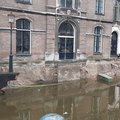
On September 1, 2020, part of the quay of the Grimburgwal in Amsterdam collapsed. The primary causes appear to be the different construction of the narrow quay, the locally deeper canal bed, and the weakening of masonry due to collisions. This is the result of the research conducted by a research team composed of experts from TU Delft, Deltares, AMS Institute, and SkyGEO, led by Mandy Korff (TU Delft/Deltares), on behalf of the City of Amsterdam. The full report with conclusions and recommendations for other quay walls in the city was published by the City of Amsterdam on April 8, 2021.
07 April 2021
Stopping Alzheimer’s before it starts

This week the Dutch project ABOARD (A personalized medicine approach for Alzheimer’s disease), a collaboration of more than thirty partners, has been launched. ABOARD aims to prepare for a future in which Alzheimer’s disease is stopped before dementia has started. ABOARD achieves this by improving diagnostic markers, developing personalized risk scores and by focusing on prevention through increased awareness of dementia and brain health.
07 April 2021
Using molecular sieves to adjust the taste of non-alcoholic beer
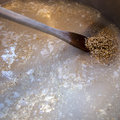
Researcher Deborah Gernat has created a new method to further develop the taste of non-alcoholic beer, in collaboration with Heineken. The technique, which is based on molecular sieves, gives brewers a new tool to bring the taste of non-alcoholic beer closer to that of regular beer. The first tests showed that the sweet 'wort taste' that often characterizes alcohol-free beer can be reduced using this method. On April 9th, Deborah Gernat will receive her doctorate on this subject at Delft University of Technology (TU Delft).
06 April 2021
Marien van der Meer new member Executive Board/Vice President Operations
Marien van der Meer will become Vice President Operations (VPO) in the Executive Board of TU Delft. The Supervisory Board has appointed Van der Meer as of 1 August 2021. She is currently a member of the Board of Directors/CFOO of the Antoni van Leeuwenhoek Netherlands Cancer Institute.
30 March 2021
Novel disaster communication system empowers communities and can save lives
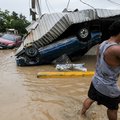
Een bijna lege telefoon kan bij rampen het verschil betekenen tussen leven en dood. TU Delft onderzoeker Indushree Banerjee heeft daarom een nieuw energie-efficiënt en betrouwbaar noodcommunicatiesysteem ontworpen voor smartphones. Het systeem maximaliseert het aantal mensen dat gedurende een langere periode kan communiceren en kan daarmee levens redden in getroffen gebieden.
29 March 2021
Clever Delft trick enables 20 times faster imaging with electron microscopy

Researchers at TU Delft have expanded upon a clever trick that increases the speed of electron microscope imaging by a factor of twenty. A simple adjustment is all that is needed: applying a voltage to the specimen holder. Through this simple intervention, a specimen that the electron microscope would normally take a week to image can now be inspected in a single night or one working day.
26 March 2021
TU Delft builds supercomputer on own campus

TU Delft is building the Delft High-Performance Computing Centre (DHPC). This supercomputer complements existing national and cloud-based facilities, and offers academics and students greater flexibility when conducting their research. The arrival of the supercomputer is accompanied by a comprehensive training programme addressing the effective use of computing facilities.
26 March 2021
TU Delft maps out airflow in Thialf stadium

The ventilation system in the Thialf ice stadium creates an airflow that affects the skaters. This is the conclusion of TU Delft aerodynamics researcher Alexander Spoelstra. He was commissioned by Thialf to closely map out the airflow, after skaters asked questions about the stadium's ventilation system. Spoelstra used a research set-up made up of lasers, helium bubbles and high-speed cameras. The technical report of the investigation was published online on 26 March.
26 March 2021
Researchers shed new light on DNA replication
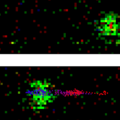
In preparation for cell division, cells need to copy (‘replicate’) the DNA that they contain. A team of researchers from TU Delft, collaborating with investigators from the Francis Crick Institute in London, has now shown that the protein building blocks involved in the initial steps of DNA replication are mobile but reduce their speed at specific DNA sequences on the genome. Their findings, which will be published on 26 March in the open-access journal Nature Communications, were facilitated using an integrated approach involving biophysics and biochemistry that will propel new discoveries in the field.
24 March 2021
Semiconductor qubits scale in two dimensions
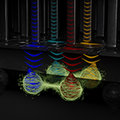
The heart of any computer, its central processing unit, is built using semiconductor technology, which is capable of putting billions of transistors onto a single chip. Now, researchers from the group of Menno Veldhorst at QuTech, a collaboration between TU Delft and TNO, have shown that this technology can be used to build a two-dimensional array of qubits to function as a quantum processor. Their work, a crucial milestone for scalable quantum technology, was published today in Nature.
